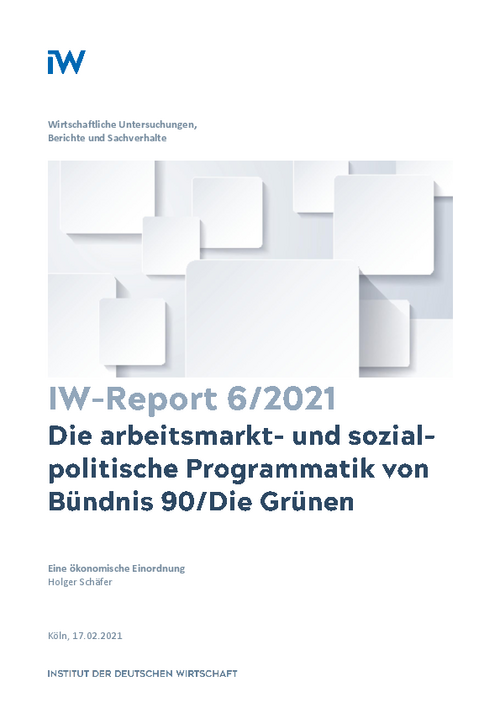The party Bündnis 90/Die Grünen has developed a comprehensive agenda of labor market and social policy reforms. These range from measures with a small scope, such as the ban on on-call work, to measures that would amount to a complete system change and affect millions of people, such as the individualization of basic income support.

The Labor Market and Social Policy Program of Bündnis 90/Die Grünen
IW-Report

The party Bündnis 90/Die Grünen has developed a comprehensive agenda of labor market and social policy reforms. These range from measures with a small scope, such as the ban on on-call work, to measures that would amount to a complete system change and affect millions of people, such as the individualization of basic income support.
One guiding motive of the programme is to increase flexibility for workers. They are to be given various possibilities to determine the length and location of their work to a greater extent than before. These increased degrees of freedom for employees go hand in hand with a restriction of flexibility for companies. In particular, far-reaching restrictions are outlined for non-standard forms of employment. A second leitmotif is legal intervention in wage formation. The increase in the minimum wage and, above all, regulations on the question of how wages for different activities should stand in relation to each other form a contrast to the free wage setting of employees and employers. A third leitmotif is to extend the benefits of social security systems. Proposals to improve the efficiency of social security are not a main focus, but nevertheless part of the programme.
This article develops a taxonomy of reform proposals and discusses the justifications as well as the advantages and disadvantages from an - albeit not the only possible - economic perspective. Where appropriate, the consequences of implementation are discussed. As a rule, this remains a qualitative assessment of the consequences. A quantitative analysis must be reserved for studies that focus on individual reform proposals.

Holger Schäfer: Die arbeitsmarkt- und sozialpolitische Programmatik von Bündnis 90/Die Grünen
IW-Report

More on the topic

IW Population Forecast 2024
The demographic transition poses major challenges for policymakers, business and society as a whole. Policymakers seeking solutions to these challenges mainly base their decisions on the quantitative data of population forecasts.
IW
Challenges for the debt brake
In 2019, Bardt et al. (2019) initially presented a comprehensive estimate of the unmet public investment needs in Germany not covered in household planning at the time, totaling around €460 billion over ten years.
IW